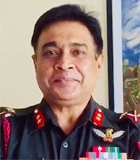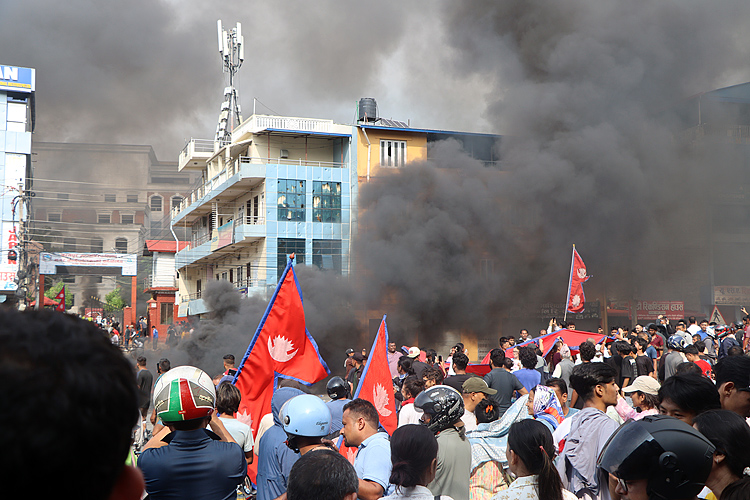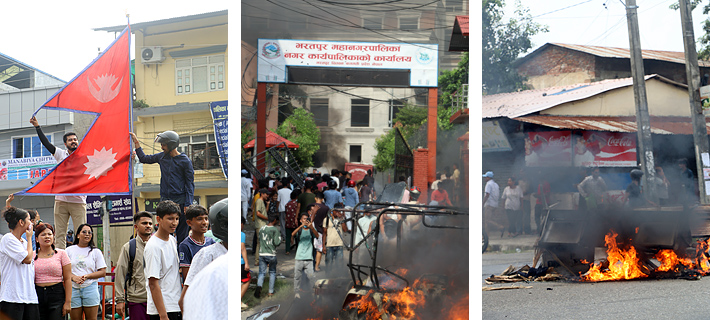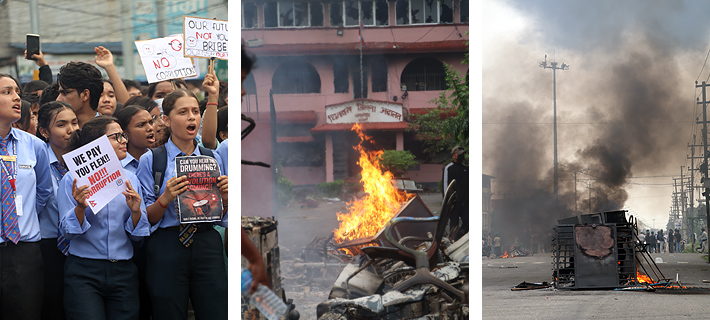INDIAN ARMED FORCES CHIEFS ON OUR RELENTLESS AND FOCUSED PUBLISHING EFFORTS

The insightful articles, inspiring narrations and analytical perspectives presented by the Editorial Team, establish an alluring connect with the reader. My compliments and best wishes to SP Guide Publications.

"Over the past 60 years, the growth of SP Guide Publications has mirrored the rising stature of Indian Navy. Its well-researched and informative magazines on Defence and Aerospace sector have served to shape an educated opinion of our military personnel, policy makers and the public alike. I wish SP's Publication team continued success, fair winds and following seas in all future endeavour!"

Since, its inception in 1964, SP Guide Publications has consistently demonstrated commitment to high-quality journalism in the aerospace and defence sectors, earning a well-deserved reputation as Asia's largest media house in this domain. I wish SP Guide Publications continued success in its pursuit of excellence.
- A leap in Indian aviation: Prime Minister Modi inaugurates Safran's Global MRO Hub in Hyderabad, Calls It a Milestone
- All about HAMMER Smart Precision Guided Weapon in India — “BEL-Safran Collaboration”
- India, Germany deepen defence ties as High Defence Committee charts ambitious plan
- True strategic autonomy will come only when our code is as indigenous as our hardware: Rajnath Singh
- EXCLUSIVE: Manish Kumar Jha speaks with Air Marshal Ashutosh Dixit, Chief of Integrated Defence Staff (CISC) at Headquarters, Integrated Defence Staff (IDS)
- Experts Speak: G20 Summit: A Sign of Global Fracture
Nepal in Flames
The Gen-Z protests began on September 8 in Kathmandu and other major cities, including Pokhara, Butwal, and Birgunj, after the government imposed a ban on major social media platforms, citing tax revenue and cyber security concerns
 |
The Author is former Chief of Staff of a frontline Corps in the North East and a former helicopter pilot. He earlier headed the China & neighbourhood desk at the Defence Intelligence Agency. He retired in July 2020 and held the appointment of Addl DG Information Systems at Army HQ. |

The restlessness among Nepal's Gen-Z was already smouldering. Just a spark was all that was needed to set it aflame. That was provided by the indiscriminate 'shoot at sight' police firing on Tuesday which led to the death of 19 young people.The protests began on Monday September 8 in Kathmandu and other major cities, including Pokhara, Butwal, and Birgunj, after the government imposed a ban on major social media platforms, citing tax revenue and cybersecurity concerns. Protesters took to streets demanding an end to institutionalised corruption and favouritism in governance (read Nepo-kids) and the revocation of the ban on social media platforms, which they see as an attempt to suppress free speech.
Gen-Z protesters torched all three branches of government – the Parliament, Singha Durbar (the Executive seat), and the Supreme Court.
Despite the ban on social media, the news of the brutal shooting and the killings spread like wildfire. Gen-Z protesters torched all three branches of government – the Parliament, Singha Durbar (the Executive seat), and the Supreme Court. Protesters also stormed prisons across the country, reportedly freeing around 900 inmates. By the evening, the 15-storey Hotel Hilton Kathmandu which opened just a year back in July 2024 after extensive delays and ₹800 crores investment and was flaunted as Nepal's Pride, had turned into a charred symbol of the unrest.
Nepal hasn't seen anything like this ever before, though violent events including the shock royal massacre of June 1, 2001 and the decade long protracted Maoist armed conflict that took place from 1996 to 2006 do give a backdrop and clues to the simmering fault lines. There is widespread anger due to lack of job opportunities exacerbated by tightening of immigration norms across the globe, especially in the US, Canada and most of Western Europe. On average, more than 2,000 people leave Nepal every single day to find better-paying work abroad. Due to political considerations, the Nepalese government decided against accepting the Indian Army's Agniveer recruitment scheme which has made a big impact as there are roughly are 32,000 Gurkhas serving in the 40 Gurkha battalions that make up the seven Gurkha regiments in the Indian Army.
On an average, more than 2,000 people leave Nepal every single day to find better-paying work abroad.
Frustration has been building up due to the cosy relationship between the three major political formulations. Nepal has had 13 governments since the monarchy was abolished in 2008, but each time with a familiar face at the top. Power has repeatedly shifted between just three leaders: K.P. Sharma Oli of the Communist Party of (CPN-UML), Pushpa Kamal Dahal of the CPN-Maoist Center, and Sher Bahadur Deuba of the Nepali Congress (NC). Yet successive governments have been beset by allegations of corruption, nepotism, incompetence, and apathy to people's concerns. Fed up with the troika of Oli-Dahal-Deuba, on March 28, 2025, a demonstration had taken place demanding the restoration of the monarchy and the appointment of the King as the Head of State.


In the 2017 general election, the Rastriya Prajatantra Party (RPP), the only significant political outfit campaigning for the monarchy's restoration, got under two per cent of total votes and won just a single seat in the Federal Lower House. Come 2022, the same party got around 6 percent of votes and 14 seats in the Lower House – a big improvement.
Nepal has had 13 governments since the monarchy was abolished in 2008, but each time with a familiar face at the top.
A 2024 nationwide survey suggested that nearly half of Nepalese favour the reversal of the country's secular status and reinstatement of the Hindu state. As the Nepali Monarch is considered a Hindu deity, some of those in favour of the Hindu state might also be supporters of the monarchy. Many see Narayanhiti, the ex-Monarchs' abode, as a pillar of stability and national interest in a country precariously sandwiched between India and China. On Tuesday evening, Nepal Army Chief Ashok Raj Sigdel addressed the nation in a televised appeal for peace. Behind him, prominently displayed, was a portrait of former Hindu King Prithvi Narayan Shah - the 18th-century monarch who unified Nepal.
Significantly, Gen-Z protesters broke into Nakkhu Jail and freed Nepal's 51-year-old former Deputy Prime Minister and Rastriya Swatantra Party (RSP) Chief Rabi Lamichhane, in prison since July 2024, for embezzlement. As the Home Minister in the Pushpa Kamal Dahal government which collapsed in July 2024, Lamichhane was looking into the possible involvement of Arzu Rana Deuba, wife of five-time Prime Minister Sher Bahadur Deuba, in a scam involving the sending of Nepali citizens to the US in the guise of Bhutanese refugees. Now the country's Foreign Minister, Arzu Rana Deuba is seen on videos being kicked and punched after a hostile mob broke into her residence. She is seen wiping blood from her face, surrounded by protesters filming her. Some dots do connect.
A 2024 nationwide survey suggested that nearly half of Nepalese favour the reversal of the country's secular status and reinstatement of the Hindu state.
Prime Minister K.P. Sharma Oli's residence was torched, and Finance Minister Bishnu Prasad Paudel was chased through Kathmandu's streets, kicked and punched. Oli has since resigned and was seen boarding a helicopter Tuesday evening, perhaps to flee the country. No friend of India, and decisively leaning towards China, Oli had broken all traditions and chosen to make his first foreign trip to China after he assumed office in July last year. So India will not shed many tears.
What India must worry, however, that the entire neighbourhood has been engulfed in violent regime change events. First to go was Pakistan Prime Minister Imran Khan in April 2022 after his party Tehreek-e-Insaf (PTI) failed to block a no-confidence motion in the National Assembly. This was seen as a bloodless coup by the Pakistani Army which has a symbiotic relationship with the CIA. Then violence erupted in Sri Lanka in July 2023 when millions of Sri Lankans, fed up of what they regarded as inept and corrupt governance under President Gotabaya Rajapaksa stormed the Presidential palace and ransacked it. Soon after, Rajapaksa fled the country, resigning days later.
What India must worry, however, that the entire neighbourhood has been engulfed in violent regime change events.
In November 2023, Mohamed Muizzu was elected as the President of the Maldives with an anti-India campaign. Of course, events have turned a full circle and Muizzu is fervently courting India now. Then on August 5, 2024, Bangladeshi Prime Minister Sheikh Hasina's 15-year rule ended as she fled weeks of deadly protests. A veritable American stooge, Muhammad Yunus leads the government, courts Pakistan and radical outfits like Jamaat-e-Islami and has tried to erase Bangladesh's independence history. Myanmar remains in constant turbulence.
These destabilising events creates a hostile neighbourhood raising security and geopolitical concerns as both the US and China fish in the muddy waters. Every Indian must stay alert and keep watch. As the fastest growing major economy in the world, India and Indians have everything to lose if we lower our guards.





